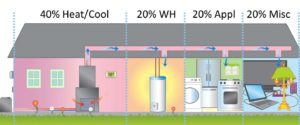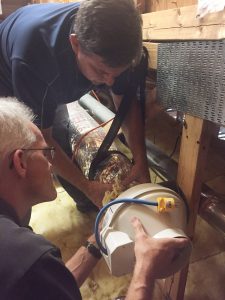#EEDay2019. FSEC researchers know first-hand how to reduce energy  costs in your home. Check out our list of priorities: https://energyresearch.ucf.edu/consumer/buildings/priorities/
costs in your home. Check out our list of priorities: https://energyresearch.ucf.edu/consumer/buildings/priorities/
Energy News
City of New Smyrna Beach Hires FSEC to Conduct Building Audits and Solar Studies

The City of New Smyrna Beach is considering solar and renewable energy resources for their municipal facilities, and has hired FSEC’s interdisciplinary team of energy analysts and solar engineers to conduct energy audits and solar feasibility assessments for 18 facilities.
The energy audits will identify cost-effective measures for reducing building energy consumption in order to optimize the expenditures for solar equipment. The solar feasibility assessment will detail the best options for renewable energy, including sizing, installation costs, maintenance costs, system life expectancy, and return on investment. FSEC will provide recommendations for reducing the city’s overall electrical demand and also for developing attainable goals for incremental solar and renewable energy installations.
For more information, contact Faith Miller, New Smyrna Beach Maintenance Operations Director, fmiller@cityofnsb.com, or Colleen Kettles, FSEC Program Director, ckettles@fsec.ucf.edu.
Coral Gables says it loves rooftop solar. A frustrated homeowner finds otherwise
Posted in Miami Herald
Coral Gables rooftop solar rules frustrate homeowner | Miami Herald
Author: Jenny Jenny Staletovich
Colleen Kettles, director of workforce and business development at FSEC, comments on consumers rights regarding solar panel installation and HOA guidelines.
WARNING: SCAMMERS Posing as Florida Solar Energy Center

WARNING: SCAMMERS are posing as the Florida Solar Energy Center. FSEC® has received several reports from consumers that they are receiving multiple calls (from different phone numbers) from a telemarketer posing to be the Florida Solar Energy Center. In some cases, they are even being referred to the FSEC website. FSEC is a research institute of the University of Central Florida (UCF). FSEC will not call consumers to offer help with an electric bill, offer a free estimate, or solicit information for a purchase.
UCF recommends you file a complaint at the Federal Communications Commission (FCC): https://www.fcc.gov/consumers/guides/stop-unwanted-calls-and-texts.
You can also visit the Florida Office of the Attorney General website for Consumer Protection.
Solar contractors must be licensed to do business in the state. You can check licenses at: http://www.myfloridalicense.com/dbpr/
Learn how to protect yourself from robocalls: https://consumersunion.org/end-robocalls/
UCF has trademark registrations for FSEC® and other related FLORIDA SOLAR ENERGY CENTER marks. Unauthorized use is a violation of federal and state laws.
Smart Vent Tech Improves IAQ and Saves Money, Energy
By Jennifer Josey
National Renewable Energy Laboratory
February 22, 2018
How many times have you completed a system upgrade for a device only to find that it’s glitchy? No one wants to “upgrade” to downgrade, and we don’t like being inconvenienced as things get “smarter.” This is just as true for our homes. Reducing energy consumption (thereby saving money) is a key driver for smart, integrated tech (think smart thermostats); however, adoption is lower if an upgrade risks compromising resident comfort.
Whole-house, smart ventilation is one such up-and-coming “smart” technology. But before it takes off, there are a couple of hurdles to jump: integration with standard heating and cooling systems, and proving the risks are limited and the benefits are many. Researchers with the University of Central Florida’s Florida Solar Energy Center® (FSEC®), in partnership with Washington State University, are tackling smart ventilation systems head on.

In a first-of-its-kind report, “Field and Laboratory Testing of Approaches to Smart Whole-House Mechanical Ventilation Control,” FSEC documented research on lab and field testing of smart ventilation control (SVC) systems. The report explains that whole-house mechanical ventilation is a critical component to a comprehensive indoor air quality (IAQ) strategy. In addition, these systems can help the residential sector more reliably design, install, and operate mechanical ventilation systems to achieve best-practice IAQ while saving energy and improving comfort, moisture, and peak load impacts.